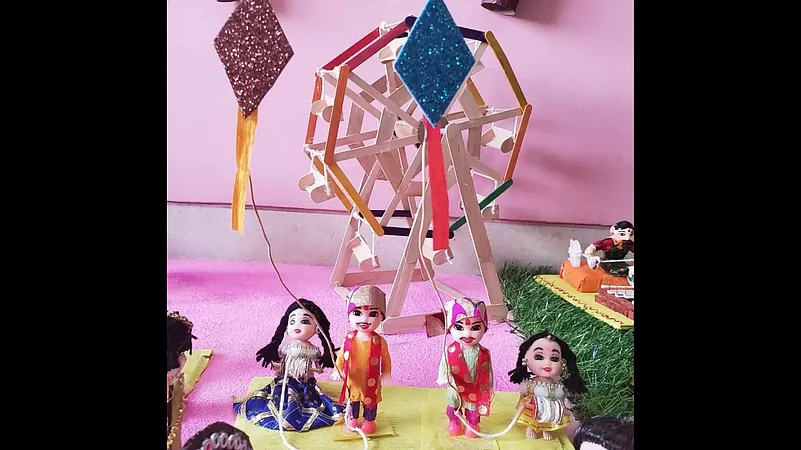'Bommala Koluvu', a rich Telugu tradition of arranging dolls to depict mythological stories is on a revival path in Jharkhand, particularly in Jamshedpur that houses 1.30 lakh community members.
Bommala Koluvu is a way of celebrating Dusshera in the community.
Jharkhand Telugu Sena (JTS) under the aegis of All India Telugu Community Welfare Association (AITCWA), a pan-India social and cultural organization of the community, has chosen this Dussehra to revive 'Bommala Koluvu'' (display of dolls), once a popular traditional way of celebrating the festival that now faces extinction in this part, JTS general secretary P Sitaram Raju said.
Nine-day festival Bommala Koluvu, which starts on the first day of the Sharad Navratra, is mainly celebrated by the community, particularly the family having unmarried girls.
The tradition of Bommala Koluvu, which used to be followed by the majority of Telugu families in Jharkhand, is now being hosted by a few families.
"Initially, we are organising it in Jamshedpur, where the Telugu community has around 1.30 lakh population and the competition will gradually be expanded to other parts of the state from next year," Raju told PTI.
"The objective of the competition is to revive the dying culture in Jharkhand as well as to make our young generation understand its importance", Raju said.
Bommala Koluvu is an old tradition and artistic display of dolls on wooden steps or planks mainly by women, and unmarried girls. It is a traditional way of exhibiting culture and depicting mythological stories through various kinds of dolls and figurines during the Navratri festival but it thematically represents social gatherings.
JTS Convenor G Gopal Krishna said six Telugu families are still maintaining this culture.
Bommala Koluvu in South India particularly in undivided Andhra Pradesh and Tamil Nadu is synonymous with 'Dussehra'.
The number of wooden steps or planks often varies in odd numbers from one to as many as nine, symbolizing nine divine days of Navratri, JTS officials said.
This is widely displayed during the Dussehra festival or Sankranti in the southern Indian states.
JTS women wing president G Vijaya Lakshmi said one needs to have patience and a sense of colours to arrange Bommala Koluvu, which is an occasion for family members and friends to get together and spend quality time.
One of the participants, S Vasanti of Mango area here, told the four-member JTS jury that she has been organizing Bommala Koluvu for the last 27 years without a break.
Among other participants, T Nagmani of Sonari and CH Madhuri of Kadma area here have been maintaining this tradition continuously for over two decades.
"In fact, I never go out of the city during Dussehra to arrange it," Vasanti said, displaying an illuminated part of a small area of her house exhibiting dolls beside the display of the successful landing of Chandrayaan 3 on the moon.
Dolls made of wood, clay, cloth, brass and silver are arranged along with statues of Gods and Goddesses in each step.
On the last day, one doll is placed flat to indicate the end of the festival. During the nine days, relatives and friends visit to see Bommala Koluvu.
A four-member jury including Vijaya Lakshmi will visit the houses of the participants taking part in the competition and select the best three on the basis of the arrangement of dolls, theme and significance, the organisers said.
The winner will be honoured tentatively on Andhra Day on November 1.
Founder President of AITCWA P S N Murthy said the purpose is to promote the rich cultural heritage and unite the community.






















